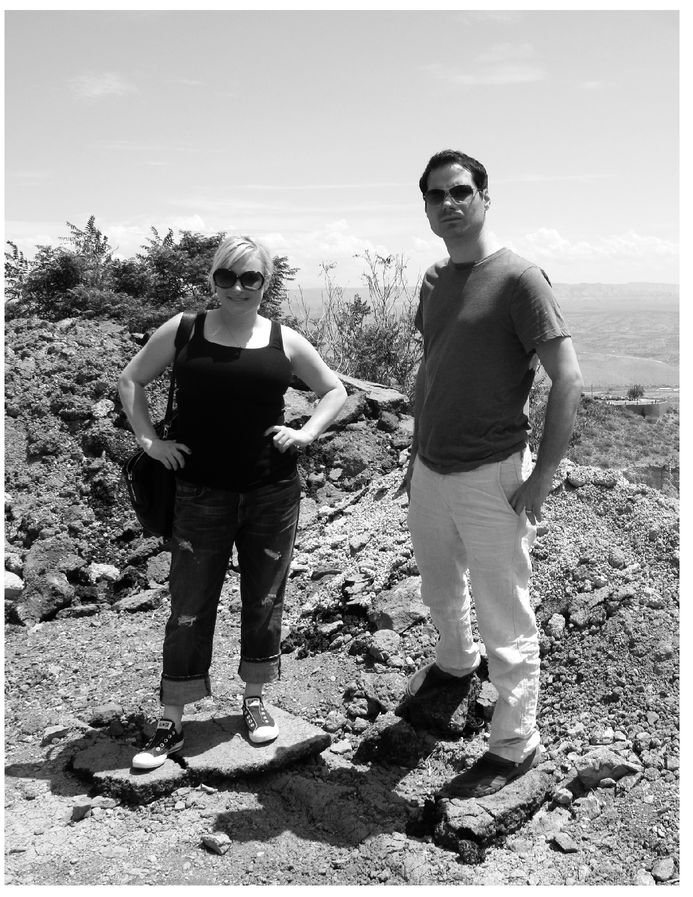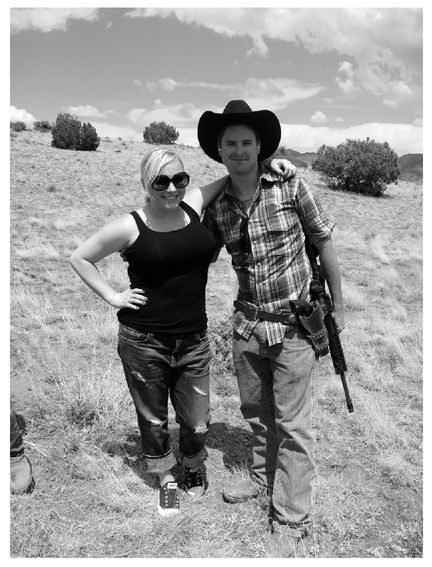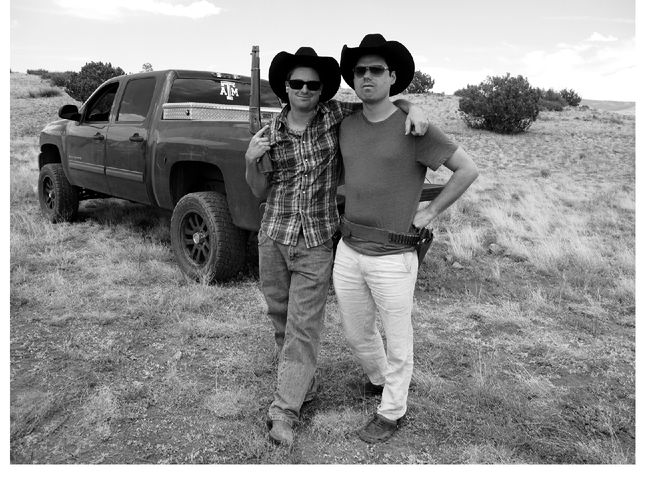America, You Sexy Bitch (26 page)
Read America, You Sexy Bitch Online
Authors: Michael Black Meghan McCain

Michael:
Yakov spends the next ninety minutes alternating between jokes and trying to sell us Yakov stuff. No exaggeration: he spends a solid ten minutes of his show giving us the hard sell for his
other
show,
Yakov’s Dinner Adventure
. There’s a video advertisement for it, and then Yakov attempts to induce us to purchase tickets by talking about how great the food is, pointing out that our seat backs have collapsible trays on them like airplanes so we can watch the dinner adventure while eating, and then lowering the price again and again like we’re all in a late-night television commercial for Ginsu knives.
Yakov spends the next ninety minutes alternating between jokes and trying to sell us Yakov stuff. No exaggeration: he spends a solid ten minutes of his show giving us the hard sell for his
other
show,
Yakov’s Dinner Adventure
. There’s a video advertisement for it, and then Yakov attempts to induce us to purchase tickets by talking about how great the food is, pointing out that our seat backs have collapsible trays on them like airplanes so we can watch the dinner adventure while eating, and then lowering the price again and again like we’re all in a late-night television commercial for Ginsu knives.
“Would you come see the show if I told you it was twenty dollars?” he asks. Someone in the crowd yells back, “What about ten dollars?”
“Sure!” Yakov grins, as though he’s made the deal of the century.
He grins all the time, regardless of the joke or the sales pitch. It starts to look like it hurts. Then, out of nowhere, he tells a long story about how he painted a huge mural for the city of New York for the one-year anniversary of September 11, but did not want his identity revealed, preferring it to be an anonymous gift. The mural was enormous, hung by cranes, and unfurled at the beginning of the memorial that year. It stayed at Ground Zero for fourteen months, before it was tattered by high winds and poor weather and had to be removed. It’s a lovely gesture, but if he wanted the gift to be anonymous, if he wanted it to be a pure expression of his love of country, why is he telling us about it now? And why is he offering pieces of the original mural for sale in the gift shop?
Because we’re so close to the stage, within Yakov’s field of vision, I feel obligated to smile and laugh as much as possible, grinning right along with him (and yes, it does hurt), but Meghan feels no such compunction. She sits beside me, arms crossed, sneering. This show is really pissing her off.
Meghan:
There is nothing wrong per se with Yakov’s comedy; it just feels like someone retelling his stories about a better time in his career. Yakov, for whatever reason, has not exactly evolved with the times, and every time he cracks “What a country!” the laughs around me are fewer and die faster. I absolutely hate the term “has-been” because I think it is often a cruel and unfair generalization, but that is how the majority of people would probably describe Yakov and his show in this moment.
There is nothing wrong per se with Yakov’s comedy; it just feels like someone retelling his stories about a better time in his career. Yakov, for whatever reason, has not exactly evolved with the times, and every time he cracks “What a country!” the laughs around me are fewer and die faster. I absolutely hate the term “has-been” because I think it is often a cruel and unfair generalization, but that is how the majority of people would probably describe Yakov and his show in this moment.
I spend a lot of time giving speeches, mostly at college campuses. Giving speeches and entertaining an audience is one of the best and most flattering things I am asked to do, but at the same time it is also indescribably difficult and draining. Engaging a roomful of college students about the future of the Republican Party and trying to make it funny and edgy at the same time is truly one of the hardest things I have tried to master. “Tried” meaning that although I think I am good, I don’t think I’m done evolving as a speaker. Either way, it is something I take extremely seriously and consider one of the greatest honors in my life. Like Yakov, I stand in front of a roomful of people telling my story.
Not that long ago, I was a college student who didn’t care about politics and felt disengaged from the process. My speeches encompass basically all of my life’s experiences up to this point. It’s about my time growing up as a senator’s daughter, my life on the road during the 2008 campaign with my father and Sarah Palin, my time as a columnist, “pundit,” and commentator, being a woman in the media and having my looks and weight scrutinized publicly, my experience in the world of Republican politics, and where I want the Republican Party and the world of politics to go. The speech continues to evolve as I do. When the 2008 election ended, I realized how profoundly changed I was as a person and that I felt like I could speak for a certain new breed of young Republicans who are evolving and don’t fit into the old-school mold.
I also felt compelled to fight for the party that I love, and worry that the way the media has come to depict the party is off-putting and one-noted—as though every Republican holds the same
beliefs, to the same degree. I’ve been on a one-woman mission to break that stifling mold and show people of all ages and backgrounds that there is room for them in the party.
beliefs, to the same degree. I’ve been on a one-woman mission to break that stifling mold and show people of all ages and backgrounds that there is room for them in the party.
I love what I do. I love the world of Republican politics and I would never want to do anything else. I am proud of the fact that there are people out there who do not just simply see me as “John McCain’s daughter,” but as someone who speaks for a side of the party that too often gets neglected and overlooked.
That being said, it’s unbelievably difficult and hard. I worry I am not evolving fast enough to keep pace with all the facets emerging from the far-right side of the party. Not to say that I am far left, but it seems that the only time the party grows a new branch lately, it’s out the crazy conservative side instead of anything that might look appealing to people under thirty—my target audience.
I pull my attention back to the show, where Yakov now stands behind a podium pretending to be “President Yakov,” and for whatever reason, I have a flash of me standing behind a podium, telling the exact same story at forty-seven that I do at twenty-seven. Good God, what if I never have any other stories than the ones I have now? What if in twenty years I am standing on a stage in Branson, telling people about my dad’s campaign for president and how it inspired me to get other people involved in the Republican Party? What if I stop evolving? What if this is as good as it is going to get with my life, my role in politics, and my career? What if I have already peaked?
As the show goes on—and on—Yakov tells stories of immigrating to the United States and becoming a citizen. To my great and uncomfortable shock, he tears up. Now, I believe that Yakov had a moving experience when he moved to this country, and that he is grateful for the help of strangers who gave him food and clothing when he didn’t have any. Still, he has been doing this show every night for twenty years. Can his tears be at all genuine? Maybe they are. Maybe I’m cynical. I don’t know. But when he ramps his touching story up into a video of the mural he “anonymously” donated to Ground Zero, and the audience comes to their feet in unified, patriotic
togetherness, I feel more than a little uncomfortable. This group togetherness ends with an exclusive offer to own a piece of the mural—a “piece of history”—conveniently available in the gift shop, along with any number of DVDs,tickets to the dinner show, and copies of his book. As I watch the worlds of patriotism and commerce collide in front of me, I am speechless. I’m a little pissed off. I also start to have a internal panic attack.
togetherness, I feel more than a little uncomfortable. This group togetherness ends with an exclusive offer to own a piece of the mural—a “piece of history”—conveniently available in the gift shop, along with any number of DVDs,tickets to the dinner show, and copies of his book. As I watch the worlds of patriotism and commerce collide in front of me, I am speechless. I’m a little pissed off. I also start to have a internal panic attack.
Michael:
Afterwards Ken and Cathy ask us what we thought. I’ve just met these people and I don’t want to say, “I thought it was one of the worst things I’ve ever seen” because maybe they loved it. Instead, I make some noncommittal noises about his considerable enthusiasm and ask them how they enjoyed it.
Afterwards Ken and Cathy ask us what we thought. I’ve just met these people and I don’t want to say, “I thought it was one of the worst things I’ve ever seen” because maybe they loved it. Instead, I make some noncommittal noises about his considerable enthusiasm and ask them how they enjoyed it.
“We thought it was terrible,” Cathy says.
I heave a sigh a relief.
“And we’ve seen it before,” she adds.
She says Yakov has been doing the same show for the past nineteen years. I don’t know that I’ve ever heard a more dispiriting statement.
“He’s been doing that same, crappy show for almost two decades?”
“Yes.”
I ask Meghan what she thought.
“It was one of the worst things I have ever seen,” she laments. “And I saw my father concede the presidency.” That’s pretty bad.
For some reason, her mood is totally sour. She’s barely talking. When I ask her what’s wrong, she says she doesn’t want to talk about it. Did I do something to piss her off again?
Meghan:
I leave the theater in a daze, stroll back through the lobby with my happily chatting clan up ahead of me. All my preshow exuberance is gone, my admiration for the patriotic paintings vanished. When we get outside, Michael and Stephie can tell something is up. They can both read me pretty well. It is not exactly that I didn’t like the show, which I didn’t really. I have been to not-so-great shows and speeches before. I think there was something about
the desperation and dated feeling of Yakov’s show that made me get down. It was sad. I wanted to know what happened to his career. I wanted to know how one has such a large following and then ends up desperately hawking swag to small audiences in Branson, Missouri. Yakov once appeared on Johnny Carson and made him laugh, and now he’s stuck wringing laughs and money out of people’s nostalgia and patriotism. He’s flogging the same story of his American Dream that he made his name on. What if that’s me? What if I am Yakov Smirnoff?
I leave the theater in a daze, stroll back through the lobby with my happily chatting clan up ahead of me. All my preshow exuberance is gone, my admiration for the patriotic paintings vanished. When we get outside, Michael and Stephie can tell something is up. They can both read me pretty well. It is not exactly that I didn’t like the show, which I didn’t really. I have been to not-so-great shows and speeches before. I think there was something about
the desperation and dated feeling of Yakov’s show that made me get down. It was sad. I wanted to know what happened to his career. I wanted to know how one has such a large following and then ends up desperately hawking swag to small audiences in Branson, Missouri. Yakov once appeared on Johnny Carson and made him laugh, and now he’s stuck wringing laughs and money out of people’s nostalgia and patriotism. He’s flogging the same story of his American Dream that he made his name on. What if that’s me? What if I am Yakov Smirnoff?
Going on this road trip has come at a very serendipitous time in my life. When I met Michael I was living in Los Angeles, trying to develop my own talk show, something I have not yet talked about publically. I uprooted my life and moved to Los Angeles thinking that this deal was going to be something amazing, the next step in my life and career. What could be better for me than a talk show with political undertones for young women? I thought it was something that had a ton of potential and could show a different, dare I say, less fluffy side to women and daytime television.
I went through an incredibly long series of testing and tryouts that ultimately ended in me not being what the producers had in mind. Still, they put me through a million paces and intense scrutiny, from the way I talk, the way I sit in a chair, which side of my face looks better to the camera, etc. It was an emotionally draining experience, and I spent more than a few days leaving the studio crying on my drive home. It felt different than the scrutiny of politics, because at least in politics people will tell you they don’t like you and your point of view to your face. In my experience, in Los Angeles everything is very foggy and clouded. I was very bad at pretending to be anything other than what I am and there was a lot of emphasis put on “faking interest”—not a huge strength of mine.
I found the business to be filled with people who were scared of hurting feelings in business settings, to the point where it seemed ridiculous. I’m not asking for sympathy; I’m in the industry I am in and I love politics and political media. I did not love what small glimpse I had into the talk show world. The entire thing ended with me spending a month trying to get a straight answer from my collaborators. I eventually had to confront them with the fact that it was obviously not happening. It was a draining experience and the first event in a very long time that made me seriously question myself. Once again I think that maybe things in my life would go easier if I could just chill out a little bit. Stop being so direct, stop having such strong opinions, etc. It gave me a hard dose of reality about the kind of person I am and the kind of person I am not.
In Jerome, Arizona, enjoying the view, if not the background singing.

We are family: brother, sister, M16.

With Jimmy McCain: “Your hat is on backwards, sir.”

Other books
My Encounter With A Sweet Alien (Alien SciFi Romance) by Meg Ripley
All the Wrong Places: A Life Lost and Found by Philip Connors
Un fragmento de vida by Arthur Machen
An Irish Doctor in Love and at Sea by Patrick Taylor
Winter's Kiss by Catherine Hapka
Atoning by Kelley Armstrong
Dangerous Depths by Kathy Brandt
Carnival World Boxed Set (Episodes 1-3) by Stokes, Tawny, Lee, Michael J
Chango's Beads and Two-Tone Shoes by William Kennedy
Wall of Spears by Duncan Lay
